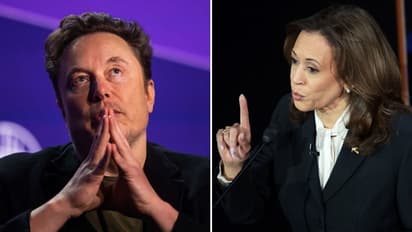'Will never reach Mars if Kamala wins': Elon Musk warns after Harris vs Trump US presidential debate 2024

Synopsis
SpaceX CEO Elon Musk warns that Mars colonization may be impossible under Kamala Harris' presidency due to regulatory barriers, following the Harris vs. Trump debate.
In the aftermath of the fiery US Presidential debate between Kamala Harris and Donald Trump, SpaceX CEO Elon Musk added a new layer to the discourse by warning that America's space ambitions, specifically his goal of colonizing Mars, could face insurmountable obstacles if Harris wins the presidency.
Musk, who has been vocal about the need for government reform to facilitate ambitious projects, took to X (formerly known as Twitter) to express his concerns.
"Unless there is significant government reform, laws & regulations will keep getting worse every year until every great endeavor, from high-speed rail between our cities to making life multiplanetary, is effectively illegal. Trump supports a government efficiency commission to allow great things to be done, Kamala does not. We will never reach Mars if Kamala wins," the Tesla CEO wrote.
The tech billionaire has long been an advocate for space exploration, particularly his dream of establishing a human colony on Mars. However, Musk argues that bureaucratic red tape, excessive regulation, and a lack of government support could stifle such advancements. He pointed out the immense challenges and costs associated with interplanetary travel, explaining that the current cost to deliver a ton of useful payload to Mars stands at a staggering $1 billion. According to Musk, this astronomical figure underscores the need for a more efficient and supportive government framework.
Musk's vision for Mars has always been ambitious, with SpaceX making strides toward reducing the cost of space travel through reusable rocket technology. He has set a goal to bring the cost of delivering payloads to Mars down to $100,000 per ton, a monumental 10,000-fold improvement over current costs. To achieve this, Musk emphasized that the Starship Super Heavy, SpaceX's reusable rocket system, will play a crucial role.
In a recent series of posts, Musk revealed that SpaceX plans to start launching Starship missions to Mars within the next two years, aiming for the Earth-Mars transfer window opening in 2026. These missions will initially be uncrewed, with the possibility of crewed flights in the following four years. Musk envisions a self-sustaining Martian city within the next two decades, provided that technological and regulatory challenges are overcome.
However, Musk’s claim that nearly anyone could save up to afford a trip to Mars, with estimated ticket prices ranging from $100,000 to $500,000, has been met with skepticism. Many critics point out the stark income disparities that would prevent the majority of people from realistically considering such an option.
Elon Musk's comments came just hours after a highly anticipated debate between Kamala Harris and Donald Trump. Media outlets were quick to weigh in, with the majority of reports declaring Harris the clear winner. The New York Times, for example, praised Harris for her composure and effective messaging, noting that Trump appeared increasingly defensive throughout the debate.
USA Today described Harris' performance as "forceful," while The Wall Street Journal noted that Harris successfully "baited" Trump into animated responses on various issues, including his ongoing legal troubles. Even Fox News, often seen as favorable to Trump, acknowledged that Harris maintained control, benefiting from the moderators' fact-checking of Trump's claims.
Check the Breaking News Today and Latest News from across India and around the world. Stay updated with the latest World News and global developments from politics to economy and current affairs. Get in-depth coverage of China News, Europe News, Pakistan News, and South Asia News, along with top headlines from the UK and US. Follow expert analysis, international trends, and breaking updates from around the globe. Download the Asianet News Official App from the Android Play Store and iPhone App Store for accurate and timely news updates anytime, anywhere.